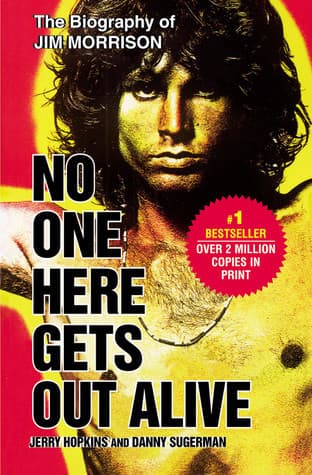
Book Review Summary: No One Here Gets Out Alive
Introduction
"No One Here Gets Out Alive" is a biography of Jim Morrison, the legendary frontman of The Doors. Written by Jerry Hopkins and Danny Sugerman, this book provides an in-depth look into Morrison's life, exploring his talent, his struggles, and his impact on music and culture. With an afterword by Michael McClure, this definitive biography offers readers a comprehensive understanding of Morrison's complex personality and the band's rise to fame.
About Jerry Hopkins
Jerry Hopkins is an American journalist and author known for his biographies of influential figures such as Elvis Presley and Jim Morrison. He served as a correspondent and contributing editor for Rolling Stone magazine for over 20 years, providing readers with insightful and well-researched articles on music and popular culture. In addition to his work on "No One Here Gets Out Alive," Hopkins has also authored numerous books on various subjects, showcasing his versatility as a writer.
Analysis of Views
-
Morrison's Talent and Legacy: Many readers acknowledge the talent and influence of Jim Morrison, both as a singer and as a lyricist. They appreciate his ability to create unique and memorable songs that continue to resonate with audiences today. The book highlights Morrison's literary aspirations and how they shaped his music, making him stand out among other rock stars of the time.
-
Biography's Depth and Accuracy: Some readers find the book to be a well-researched and engaging biography that delves into the complexities of Morrison's life. They appreciate the authors' empathy towards the subject and their ability to provide a nuanced portrayal of Morrison's personality. However, others feel that the book could have gone deeper into exploring the true essence of Morrison's character, particularly underneath the public image he projected.
-
Drunken Antics and Self-Destruction: The book recounts Morrison's self-destructive behavior, including his excessive drinking and drug use. Readers find this aspect of the book to be both fascinating and troubling, as it highlights the personal struggles that contributed to Morrison's early demise. However, some readers express frustration with the authors' tendency to focus too much on these aspects of Morrison's life, detracting from the overall narrative.
-
Authors' Fanaticism: A few readers mention that the authors, particularly Danny Sugerman, come across as overly enthusiastic fans of Jim Morrison. They feel that this bias may have influenced the book's content and perspective, leading to an overemphasis on certain aspects of Morrison's life. However, others appreciate the authors' passion for their subject matter and their dedication to providing a comprehensive account of Morrison's life.
-
Quoting Conversations: Some readers find it annoying when the book quotes conversations verbatim without providing clear attribution or context. They argue that such practices cast doubt on the accuracy of these accounts and detract from the overall credibility of the book. However, others acknowledge that quoting conversations can add depth and authenticity to a biography, even if it raises questions about accuracy.
Reasons for Recommendation
-
In-Depth Exploration: Readers recommend "No One Here Gets Out Alive" for its comprehensive exploration of Jim Morrison's life, music, and legacy. The book provides a detailed account of Morrison's experiences, struggles, and achievements, offering readers a well-rounded understanding of his impact on music history.
-
Engaging Writing Style: Many readers appreciate the authors' writing style, which is engaging, informative, and accessible. The book is written in a way that makes it easy for readers to follow along and become immersed in the story of Jim Morrison and The Doors. The authors' use of vivid descriptions and personal anecdotes adds depth to the narrative, making it a compelling read for fans and non-fans alike.
-
Inspirational Legacy: Jim Morrison's music and persona continue to inspire generations of musicians and fans alike. "No One Here Gets Out Alive" serves as a testament to Morrison's enduring legacy, providing readers with insights into his creative process, his artistic vision, and his impact on popular culture. The book offers a glimpse into the mind of a talented artist who left an indelible mark on music history.
Reasons for Not Recommendation
-
Lack of Objectivity: Some readers feel that the book lacks objectivity in its portrayal of Jim Morrison, particularly in its overemphasis on his drunken antics and self-destructive behavior. They argue that this focus detracts from a more balanced understanding of Morrison's character, leading to an incomplete or distorted portrait of his life.
-
Inaccurate Quotations: A few readers express frustration with the book's inclusion of verbatim quotes from conversations without clear attribution or context. They argue that such practices raise questions about the accuracy of these accounts and detract from the overall credibility of the book. While some readers acknowledge the importance of including personal anecdotes in biographies, they feel that accuracy should be prioritized over sensationalism.
Conclusion
"No One Here Gets Out Alive" offers readers a comprehensive biography of Jim Morrison, exploring his life, music, and legacy as the enigmatic frontman of The Doors. While some readers appreciate its in-depth exploration and engaging writing style, others feel that it lacks objectivity in its portrayal of Morrison's character and struggles with accuracy in quoting conversations. Overall, the book serves as a testament to Morrison's enduring influence on music history and provides readers with insights into his creative process and personal journey.